- Home
- Lisa Wingate
A Thousand Voices
A Thousand Voices Read online
Praise for Lisa Wingate’s Accent novels, the “Tending Roses Series,” which include Tending Roses, Good Hope Road, The Language of Sycamores, and Drenched in Light
Drenched in Light
“Heartfelt and moving, enriched by characters drawn with compassion and warmth.”
—Jennifer Chiaverini, Author of Circle of Quilters
“Another winner.”
—Booklist
“A deep character study.”
—The Best Reviews
“A poignant tale of self-discovery.”
—Kendra Young, Lake Travis View (TX)
The Language of Sycamores
“Heartfelt, honest, and entirely entertaining…this poignant story will touch your heart from the first page to the last.”
—Kristin Hannah
“Wingate’s smoothly flowing prose fills the pages with emotional drama.”
—Romantic Times (Top Pick)
Good Hope Road
“A novel bursting with joy amidst crisis: small-town life is painted with scope and detail in the capable hands of a writer who understands longing, grief, and the landscape of a woman’s heart.”
—Adrian Trigiani, author of the Big Stone Gap trilogy
“Wingate has written a genuinely heartwarming story about how a sense of possibility can be awakened in the aftermath of a tragedy to bring a community together and demonstrate the true American spirit.”
—Booklist
Tending Roses
“A story at once gentle and powerful about the very old and the very young, and about the young woman who loves them all. Richly emotional and spiritual, Tending Roses affected me from the first page.”
—Luanne Rice, author of Sandcastles
“You can’t put it down without…taking a good look at your own life and how misplaced priorities might have led to missed opportunities. Tending Roses is an excellent read for any season, a celebration of the power of love.”
—El Paso Times
Praise for Lisa Wingate’s
“Texas Hill Country” Series
Over the Moon at the Big Lizard Diner
“A beautifully crafted and insightfully drawn page-turner…this is storytelling at its best.”
—Julie Cannon, author of the Homegrown
series and Those Pearly Gates
“A warmhearted tale of love and longing, grits and cowboys, horse psychology and dinosaur tracks.”
—Claire Cook, author of Multiple Choice and Must Love Dogs
“A feisty, flirtatious, homegrown Texas tale.”
—Dixie Cash, author of My Heart May Be Broken,
But My Hair Still Looks Great
“Wingate lets her magical Texas setting and idiosyncratic supporting characters shine.”
—Kirkus Reviews
Lone Star Café
“A charmingly nostalgic treat…. Wingate handles the book’s strong spiritual element deftly, creating a novel that is sweetly inspirational but not saccharine.”—Publishers Weekly
“A beautifully written, heartwarming tale about finding love where you least expect it.”
—Barbara Freethy
“Leaves you feeling like you’ve danced the two-step across Texas.”
—Jodi Thomas
Texas Cooking
“Lisa Wingate writes with depth and warmth, joy and wit.”
—Debbie Macomber, author of Susannah’s Garden
“Texas Cooking… will have readers drooling for the next installment…[a] beautifully written mix of comedy, drama, cooking, and journalism.”
—Joy Dickinson, The Dallas Morning News
“Takes the reader on a delightful journey into the most secret places of every woman’s heart.”
—Catherine Anderson
“The story is a treasure. You will be swept along, refreshed and amused. … Give yourself a treat and read this tender, unusual story.”
—Dorothy Garlock
OTHER NOVELS BY LISA WINGATE
The Tending Roses Series
Tending Roses
Good Hope Road
The Language of Sycamores
Drenched in Light
The Texas Hill Country Series
Texas Cooking
Lone Star Café
Over the Moon at the Big Lizard Diner
A THOUSAND VOICES
LISA WINGATE
NAL Accent
Published by New American Library, a division of Penguin Group (USA) Inc., 375 Hudson Street, New York, New York 10014, USA Penguin Group (Canada), 90 Eglinton Avenue East, Suite 700, Toronto, Penguin Group (Canada), 90 Eglinton Avenue East, Suite 700, Toronto, Penguin Books Ltd., 80 Strand, London WC2R 0RL, England Penguin Ireland, 25 St. Stephen’s Green, Dublin 2, Ireland (a division of Penguin Books Ltd.) Penguin Group (Australia), 250 Camberwell Road, Camberwell, Victoria 3124, Australia (a division of Pearson Australia Group Pty. Ltd.) Penguin Books India Pvt. Ltd., 11 Community Centre, Panchsheel Park, New Delhi-110 017, India Penguin Group (NZ), 67 Apollo Drive, Rosedale, North Shore 0745, Auckland, New Zealand (a division of Pearson New Zealand Ltd.) Penguin Books (South Africa) (Pty.) Ltd., 24 Sturdee Avenue, Rosebank, Johannesburg 2196, South Africa
Penguin Books Ltd., Registered Offices: 80 Strand, London WC2R 0RL, England
First published by NAL Accent, an imprint of New American Library, a division of Penguin Group (USA) Inc.
Copyright 1 Wingate Media, LLC, 2007
Conversation Guide copyright 1 Penguin Group (USA) Inc., 2007
All rights reserved
LIBRARY OF CONGRESS CATALOGING-IN-PUBLICATION DATA:
Wingate, Lisa.
A thousand voices/Lisa Wingate.
p. cm.
ISBN: 978-1-1012-1103-8
1. Adopted children—Fiction. 2. Musicians—Fiction. 3. Choctaw Indians—Fiction. 4. Parents—Fiction. 5. Self-perception—Fiction. 6. Oklahoma—Fiction. I. Title.
PS3573. I53165T54 2007
813'.6—dc22
2006038598
Without limiting the rights under copyright reserved above, no part of this publication may be reproduced, stored in or introduced into a retrieval system, or transmitted, in any form, or by any means (electronic, mechanical, photocopying, recording, or otherwise), without the prior written permission of both the copyright owner and the above publisher of this book.
PUBLISHER’S NOTE
This is a work of fiction. Names, characters, places, and incidents either are the product of the author’s imagination or are used fictitiously, and any resemblance to actual persons, living or dead, business establishments, events, or locales is entirely coincidental.
The publisher does not have any control over and does not assume any responsibility for author or third-party Web sites or their content.
The scanning, uploading, and distribution of this book via the Internet or via any other means without the permission of the publisher is illegal and punishable by law. Please purchase only authorized electronic editions, and do not participate in or encourage electronic piracy of copyrighted materials. Your support of the author’s rights is appreciated.
To those who walked,
And those who remember,
To those who carry the soil and the stories,
And those whose voices sing
Among a thousand leaves.
CONTENTS
ACKNOWLEDGMENTS
CHAPTER 1
CHAPTER 2
CHAPTER 3
CHAPTER 4
CHAPTER 5
CHAPTER 6
CHAPTER 7
CHAPTER 8
CHAPTER 9
CHAPTER 10
CHAPTER 11
CHAPTER 12
CHAPTER 13
CHAP
TER 14
CHAPTER 15
CHAPTER 16
CHAPTER 17
CHAPTER 18
CHAPTER 19
CHAPTER 20
CHAPTER 21
CHAPTER 22
CHAPTER 23
ACKNOWLEDGMENTS
In considering the list of friends and kind strangers who contributed time, encouragement, and expertise during the writing of A Thousand Voices, it seemed fitting to invoke a quote from John Donne’s famous meditation: “No man is an island, entire of itself; every man is a piece of the continent, a part of the main….” The same holds true for books, I think. No idea travels from the mind of author to the printed page without having been ferried by at least a dozen passing ships. While journeying through this final story in the Tending Roses series, I’ve sailed along with some fantastic and generous people, for whom I am truly grateful.
My heartfelt thanks goes out to members of the Choctaw Nation, specifically personnel of the Capitol Museum and festival organizers, including Willard Polk, who answered questions about the festival and provided valuable information about Choctaw beliefs and traditions. Thank you, also, to staff members and participants at the Choctaw Labor Day Festival and powwow—as gracious, fun-loving, and hospitable a group of people as exists anywhere.
I am especially thankful, as always, to members of my family, including my mother, Sharon, and my mother-in-law, Janice, for proofreading, traveling to book events, and shuttling kids to various activities. My thanks, also, to Mandy Carter for fantastic editing and research help. Thank you to Buck and Cara McAdams (aka Uncle Buck and Aunt Sut) for helping with research in the Antlers area, and for always having cookies on the counter and a light in the window. Thanks, Aunt Sut, for sitting up with me until all hours, digging through land abstracts and bits of Choctaw history. Thank you to my boys for cooking boxed macaroni and cheese for supper when necessary, and always being willing to trek off on research trips at a moment’s notice.
My gratitude goes to the wonderful people at Penguin Group (USA) and NAL, who turn stories into books. To Leslie Gelbman, Kara Welsh, Claire Zion, and to my editor, Ellen Edwards, thank you for being the strong, talented women you are and for believing in me over the years. Thank you also to my wonderful agent, Claudia Cross of Sterling Lord Literistic, and to the many booksellers and media personnel who have given so much support to my books.
Last, my heartfelt thanks to readers, far and near, who have sent letters and e-mails, encouraged me when I needed it, inspired stories to beget more stories, recommended the books to others, and made the dreams of a would-be writer come true.
“…they are a people that will walk to the last, or I do not know how we could get on.”
—Major Francis W. Armstrong,
Choctaw Removal Agent, 1832
A THOUSAND VOICES
CHAPTER 1
The old Choctaws say that a man who walks away from his past will wander lost forever. If he takes root in a soil that is not his own, the tree of his life will struggle for breath, and water, and nourishment. In dry seasons, the leaves die easily because his roots are shallow. We are meant to be grown in ground that is rich with the bones, and the blood, and the voices of our ancestors. In 1831, the first of the Choctaw were forced from their lands in Mississippi and moved to reservations in Oklahoma. They took with them their language, their customs, their stories of the old times—and they took soil. The women ground the bones of the ancestors and sewed the dust and soil into the hems of their clothing. As they left their homes, they touched the leaves, and the grasses, and the waters of the streams, saying good-bye to the old places. They marched in the bitter cold of an early winter, carrying the young, the old, and the sick, yet they did not pour out the soil and the bones along the trail. In open fields, with only blankets for protection from the snow and the wind, they huddled together. Death, it is said, was hourly among them, claiming nearly one-third of their number, yet those who remained carried the stories and the soil. They spread it in a new place and watered it with their tears, and the tree began to grow again.
The Choctaw are a wise people. They know that ancestor bones nourish all who come after, and so they keep the past alive.
If not for that fact, I might have wandered forever. The summer I found the Choctaw was the summer I found myself. Until that time, I’d never even wondered about my real father and his Choctaw heritage. He was a faceless shadow in my mind, the reason my skin was dark and my eyes were brown, not blue like Mama’s. He was the reason folks in town looked at me like I was dirt, and the reason Uncle Bobby called me little nigger girl when he started coming around Granny’s house after Mama died. Uncle Bobby said I was just darned lucky Granny kept me on at her house, because who else would want a little brown-skinned, knobby-legged butthead like me hanging around?
Old Mrs. Vongortler, the lady who owned the farm across the river from Granny’s house, said I shouldn’t listen to talk like that. She said every bird in the air came from a thought of God, and so did I. I’d never imagined God thinking about me. It’s a powerful thing to realize you were put in this world on purpose. It changes the way you feel about everything afterward. It changed the way I felt about Mrs. Vongortler. After that, she became Grandma Rose to me. She loved me in a way my real granny didn’t, in a way nobody else ever had. Grandma Rose and I understood each other. When she died, I wanted to lie down on that bed and die right along with her.
Even after she was gone, Grandma Rose took care of me. Her granddaughter and grandson-in-law, Karen and James Sommerfield, adopted me at twelve years old and gave me the family I’d always wanted. I left the little paper-thin house on the river and moved into a life that was both foreign and frightening, and filled with possibilities. I buried the past in the grave with my real granny, and tried to forget it ever happened.
The old Choctaws would say I had poured out the soil and the bones, and that everything that came afterward—a life in Kansas City with James and Karen, an education at an arts high school where I could pursue my love of music, concert opportunities, and chances to travel—would be shallow-rooted. The past, even if you don’t talk about it, still exists, and no matter how hard you try to turn your back, no matter how dangerous it is to look at, part of you cries out to understand it. You move through life like a person balancing on a log fallen over a river, waiting for the moment the wood will crack and you’ll sink into all the dark things you can still see below.
I could never tell James and Karen, my new parents who loved me, that somewhere inside there was the scared, silent little girl from the tiny house in the tall grass above Mulberry Creek. That girl was filled with questions, and even years later, she was still wandering the world, in search of answers.
When I graduated from high school, I traveled as far away from her as I could—to Europe for a year in a student musical exchange orchestra, and then to Ukraine for a term of teaching English and music in a mission project for orphaned children. My commission there was over too soon, and it was time to go home. College was waiting, and life was waiting, and my family was waiting.
Barry was waiting, too, even though he wasn’t supposed to be. Barry and I had dated since my first year at Harrington Academy, when he befriended me, tutored me, and rescued me from teenage oblivion. When I left for Europe, we’d decided it was time for both of us to move on. Still, Barry kept the cards and e-mails coming, telling me about the music department at Missouri State. He talked about college life and dorm rooms, fraternity houses and apartments, things that seemed a million miles away to me. When I came home, he dropped everything and met me at the airport.
“Hey, D,” he said, just like no time had passed. At some point in our history together, Barry had shortened my name to D. He gave nicknames to everyone and everything he cared about. Even his saxophone, Puff.
I turned from the luggage carousel, surprised by the sound of his voice. It was deeper than I remembered, different from on the phone. “Hey, Bear-bear.” I paused
to study him. He looked older, his chin more square and his baby-faced cheeks slightly hollowed out. He’d let his brown hair grow longer and put brassy highlights in it. “You look different,” I said, and he grinned, seeming pleased.
“Got highlights.” Grabbing a strand of hair, he held it out for inspection. “Like it?” His eyebrows rose hopefully, and I couldn’t help smiling. Same old Barry. He could never be cool about anything.
“I do.” I motioned to the hair. “I really do.”
Stepping back, he inspected me slowly. “Gosh, Dell, you look great.” He blinked like he couldn’t quite take in the picture. “I mean, really great. You do.” He leaned slightly closer, as if he thought he might kiss me.
“Thanks.” It was hard to know how to respond, and I shifted away uncomfortably. The compliment was sincere. Everything about Barry was sincere, which was what had always made our relationship so hard. He sincerely loved me, and I sincerely needed him as a friend, and that isn’t the same thing.
Stretching out his arms, he grabbed me in an impulsive bear hug, and as usual, I went stiff. I’d never been good at hugs and things like that—Barry knew that about me, and he didn’t mind. He understood that those feelings came from long before I met him. When Mama was messed up, she used to hug me until I felt like I’d smother. All I could smell was weed and sweat and the faint scent of VO5 shampoo as we staggered back and forth in a painful embrace.
Barry let go and reached for something on the luggage carousel. “That yours?” he asked, grabbing the battered wheelie bag that had been through two continents and over a dozen countries.

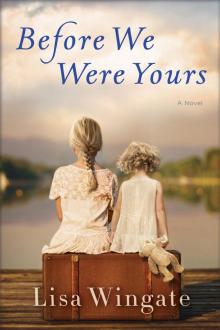 Before We Were Yours
Before We Were Yours A Sandy’s Seashell Shop Christmas
A Sandy’s Seashell Shop Christmas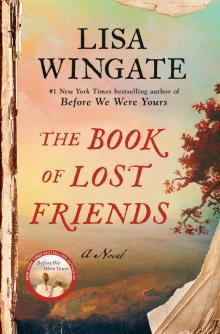 The Book of Lost Friends
The Book of Lost Friends Larkspur Cove
Larkspur Cove The Sea Glass Sisters
The Sea Glass Sisters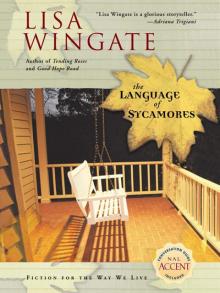 The Language of Sycamores
The Language of Sycamores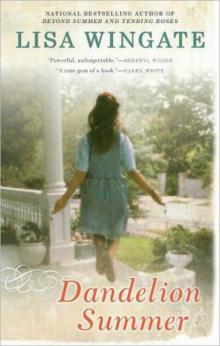 Dandelion Summer
Dandelion Summer Word Gets Around
Word Gets Around Beyond Summer
Beyond Summer Firefly Island
Firefly Island The Tidewater Sisters: Postlude to The Prayer Box
The Tidewater Sisters: Postlude to The Prayer Box Talk of the Town
Talk of the Town![Blue Sky Hill [01] A Month of Summer Read online](http://i1.bookreadfree.com/i1/03/29/blue_sky_hill_01_a_month_of_summer_preview.jpg) Blue Sky Hill [01] A Month of Summer
Blue Sky Hill [01] A Month of Summer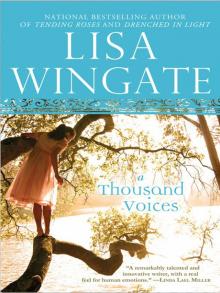 A Thousand Voices
A Thousand Voices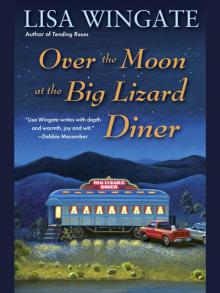 Over the Moon at the Big Lizard Diner
Over the Moon at the Big Lizard Diner Never Say Never
Never Say Never Good Hope Road
Good Hope Road The Summer Kitchen
The Summer Kitchen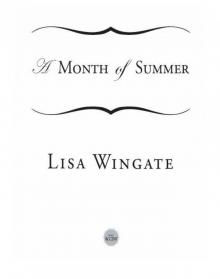 A Month of Summer
A Month of Summer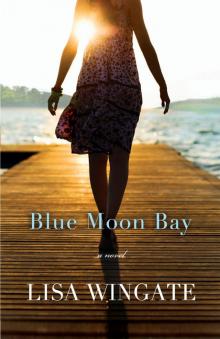 Blue Moon Bay
Blue Moon Bay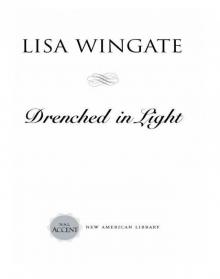 Drenched in Light
Drenched in Light The Sea Keeper's Daughters
The Sea Keeper's Daughters